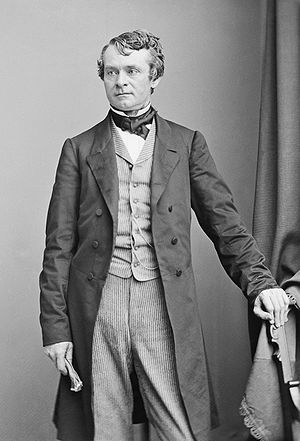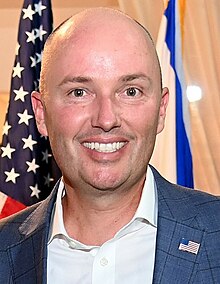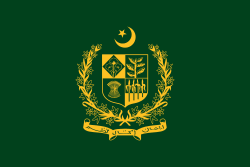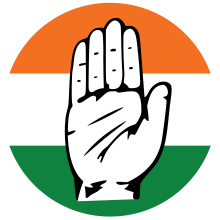Portal:Politics
| Main | Topics and categories | Tasks and projects |
The Politics portal
Politics (from Ancient Greek πολιτικά (politiká) 'affairs of the cities') is the set of activities that are associated with making decisions in groups, or other forms of power relations among individuals, such as the distribution of resources or status. The branch of social science that studies politics and government is referred to as political science.
It may be used positively in the context of a "political solution" which is compromising and non-violent, or descriptively as "the art or science of government", but also often carries a negative connotation. The concept has been defined in various ways, and different approaches have fundamentally differing views on whether it should be used extensively or in a limited way, empirically or normatively, and on whether conflict or co-operation is more essential to it.
A variety of methods are deployed in politics, which include promoting one's own political views among people, negotiation with other political subjects, making laws, and exercising internal and external force, including warfare against adversaries. Politics is exercised on a wide range of social levels, from clans and tribes of traditional societies, through modern local governments, companies and institutions up to sovereign states, to the international level.
In modern nation states, people often form political parties to represent their ideas. Members of a party often agree to take the same position on many issues and agree to support the same changes to law and the same leaders. An election is usually a competition between different parties.
A political system is a framework which defines acceptable political methods within a society. The history of political thought can be traced back to early antiquity, with seminal works such as Plato's Republic, Aristotle's Politics, Confucius's political manuscripts and Chanakya's Arthashastra. (Full article...)
Selected article
The Parliament of 1327, which sat at the Palace of Westminster between 7 January and 9 March 1327, was instrumental in the transfer of the English Crown from King Edward II to his son, Edward III. Edward II had become increasingly unpopular with the English nobility due to the excessive influence of unpopular court favourites, the patronage he accorded them, and his perceived ill-treatment of the nobility. By 1325, even his wife, Queen Isabella, despised him. Towards the end of the year, she took the young Edward to her native France, where she entered into an alliance with the powerful and wealthy nobleman Roger Mortimer, who her husband previously had exiled. The following year, they invaded England to depose Edward II. Almost immediately, the King's resistance was beset by betrayal, and he eventually abandoned London and fled west, probably to raise an army in Wales or Ireland. He was soon captured and imprisoned.
Featured picture

Andrew Gregg Curtin (1817–1894) was a U.S. lawyer and politician. He served as the 15th Governor of Pennsylvania during the American Civil War. During the Civil War, Curtin organized the Pennsylvania reserves into combat units, and oversaw the construction of the first Union military camp for training militia. After the Battle of Gettysburg, Governor Curtin was the principal force behind the establishment of the National Cemetery there. After serving two terms as governor, Curtin was appointed ambassador to Russia by Ulysses S. Grant, and he later served in the House of Representatives from 1881 until 1887.
Selected quote
Selected biography
Guillermo David Endara Galimany (May 12, 1936 – September 28, 2009) was a Panamanian politician who served as the president of Panama from 1989 to 1994. Raised in a family allied to Panameñista Party founder Arnulfo Arias, Endara attended school in exile in the United States and Argentina following Arias's removal from power. Endara later received a law degree in Panama. He subsequently served as a member of Panama's National Assembly, and briefly as a government minister before heading into exile again following Arias' third overthrow.
Did you know (auto-generated) -

- ... that Nargess Eskandari-Grünberg, the new mayor of Frankfurt, gave birth to her first child while a political prisoner in the wake of the Iranian Revolution?
- ... that after a career as political journalist, Peter Merseburger wrote biographies of Der Spiegel founder Rudolf Augstein and chancellor Willy Brandt?
- ... that Valentina Bodrug-Lungu has declared that Moldova's political climate does not encourage female participation, despite having a woman president?
- ... that after its merger with India, the last raja of Jubbal State joined the Indian Foreign Service?
- ... that Matt Stoller believes that "nearly any other cause or political relationship should be sacrificed" to break up monopolies?
- ... that Australian senator Ben Small had been a ship's officer, bar owner, paramedic, ambulance trainer, and logistician before entering politics?
More did you know...
- ...that the Japanese Farmer-Labour Party was banned just a few hours after its foundation in 1925?
- ...that Glenn Beck introduced a "Black-Robed Regiment" of pastors from various denominations during his Restoring Honor rally in 2010, and launched a news website called The Blaze three days later?
- ...that the book Targeted Killing in International Law argues support in the Western world for targeted killing increased following the September 11 attacks?
- ...that the National Assembly of Azerbaijan was the first secular republican parliament in the Muslim world?
- ...that in world-system theory, sociologists debate whether two world-systems have ever existed during the same period?
- ...that former Republican California State Senator Becky Morgan served on the Board of Trustees of both her alma maters, Stanford University and Cornell University?
- ...that Caedwalla of Wessex conquered southeast England during his brief 7th century reign?
- ...that tiao-kuai is the quasi-federal administration system in China?
In this month
- April 1, 1979 – Iran's government becomes an Islamic Republic by a 98% vote, overthrowing the Shah officially.
- April 9, 1948 – the period known as La Violencia begins with the assassination of Colombian Liberal Party leader Jorge Eliécer Gaitán. For the next ten years Liberals, Communists and Conservatives would fight each other in the conflict.
- April 9, 2003 – Government of Saddam Hussein overthrown by American forces in Iraq.
- April 19, 2006 – Han Myung-sook becomes South Korea's first female Prime Minister.
- April 24, 2005 – Presidential elections in Togo return Faure Gnassingbe to power two months after he was installed by the military following the death of his father, Gnassingbé Eyadéma.
- April 28, 1937 – Saddam Hussein, the President of Iraq was born.
- April 30, 1945 – Adolf Hitler and his wife Eva Braun, commit suicide as the Red Army approached the Führerbunker in Berlin. Karl Dönitz succeeds Hitler as President of Germany; Joseph Goebbels succeeds Hitler as Chancellor of Germany.
News and Current events
- August 11: 4 local government areas in New South Wales, Australia locked down after COVID-19 case
- August 11: Australia: AstraZeneca vaccine access expanded by Victorian government
- August 1: Australia: Victorian lockdown lifted
- July 29: Tunisia's president dismisses prime minister, suspends parliament
- July 25: Australia: Wikinews interviews Reg Kidd, mayor of the City of Orange, about COVID-19 lockdown and local government
- July 23: South Australia enters week-long lockdown to contain COVID-19 Delta variant spread
- July 21: Technological University Dublin senior lecturer Dr Lorcan Sirr speaks to Wikinews on housing market in Ireland
- July 21: Three rural councils in New South Wales, Australia enter 7-day lockdown
- July 21: Australia: Victoria lockdown extended by a week with 85 active cases recorded
- July 15: California governor signs new state budget, eligible Californians to get stimulus payments
Topics and categories
General images
Related portals
Associated Wikimedia
The following Wikimedia Foundation sister projects provide more on this subject:
-
Commons
Free media repository -
Wikibooks
Free textbooks and manuals -
Wikidata
Free knowledge base -
Wikinews
Free-content news -
Wikiquote
Collection of quotations -
Wikisource
Free-content library -
Wikiversity
Free learning tools -
Wiktionary
Dictionary and thesaurus




























































